Taking care of your body's health and wellness is of the utmost importance. One aspect of this is understanding the importance of a healthy spleen, as recognized by Traditional Chinese Medicine (TCM). When the spleen is not functioning properly, it can lead to the condition known as spleen qi deficiency.
This article is designed to provide you with a comprehensive understanding of what Spleen Qi Deficiency is, the symptoms that come with it, and the various treatment options available to you. It's important to take the time to read and understand this information, as spleen qi deficiency can have a significant impact on your overall health and well-being. Our article on GU Syndrome is a great place to start if problematic areas are widespread or do not have clear root causes.
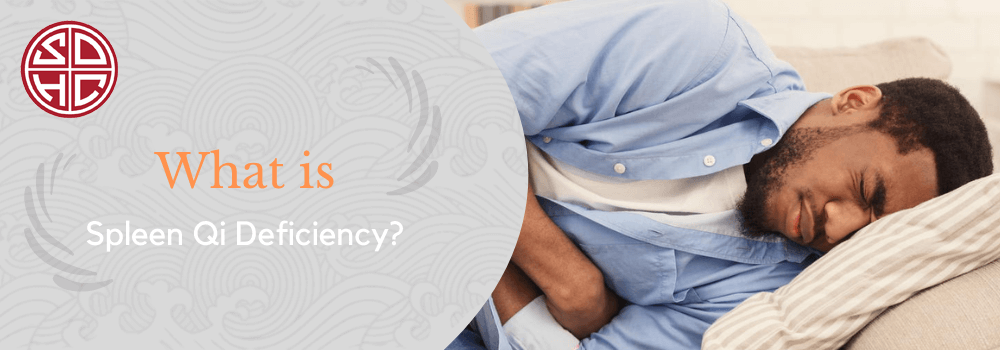
What is Spleen Qi Deficiency?
Spleen Qi Deficiency is a common condition that can have a significant impact on one's overall health and well-being. In Traditional Chinese Medicine (TCM), the spleen is considered to be the foundation of the body's Qi (vital energy) and blood. It is responsible for the digestion and absorption of food and fluids, as well as the production of blood.
When the spleen is not functioning properly, it can lead to a deficiency in Qi throughout the body. This can manifest as a variety of symptoms, such as fatigue, weakness, and a lack of appetite. This can also cause you to feel sluggish, have brain fog and weaker than you usually are.
In addition, spleen qi deficiency can also lead to a weakened immune system and an increased vulnerability to infection. This can cause you to catch colds and flu more frequently, and have a harder time recovering from them.
It's important to note that Spleen Qi Deficiency is not a condition that should be taken lightly. Left untreated, it can lead to a wide range of health problems and can greatly affect your overall quality of life. By addressing Spleen Qi Deficiency through dietary and lifestyle changes, acupuncture, herbal medicine, and other therapies, it is possible to improve symptoms and overall well-being.
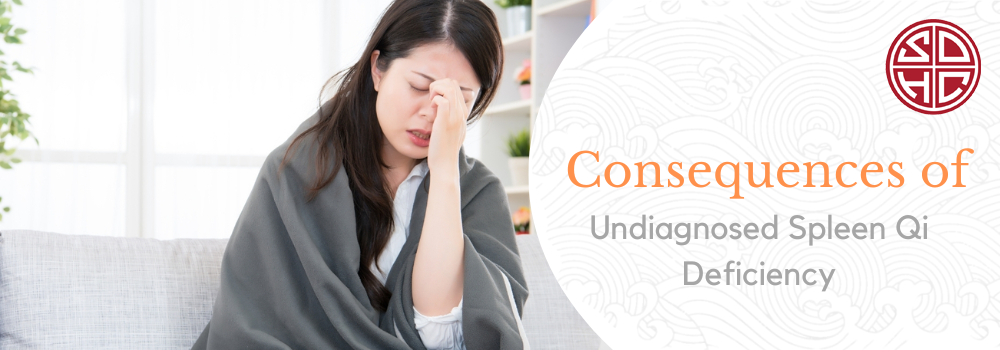
Consequences of Undiagnosed Spleen Qi Deficiency
Undiagnosed Spleen Qi Deficiency can have serious and long-term consequences on one's overall health. Spleen Qi deficiency can lead to fatigue, poor appetite, weight loss, and loose stools which can affect daily activities and productivity.
Spleen Qi deficiency can cause dampness and phlegm to build up in the body, leading to health problems such as allergies, asthma, and chronic sinusitis. These conditions can be crippling and greatly affect quality of life.
Additionally, Spleen Qi Deficiency can weaken the immune system, making a person more susceptible to infections. It can also affect digestion and metabolism which can lead to nutrient deficiencies and weight gain.
It's important to be aware of the signs and symptoms of Spleen Qi Deficiency and to consult a healthcare professional for proper diagnosis and treatment. Left untreated, Spleen Qi Deficiency can lead to chronic health problems that can be difficult to manage and can have a significant impact on one's overall well-being. Don't let Spleen Qi Deficiency go undiagnosed, take control of your health and seek help.
Spleen Qi Deficiency Symptoms
Some of the most common symptoms of spleen qi deficiency include:
Fatigue and weakness
Fatigue and weakness are common symptoms of spleen qi deficiency as the spleen is responsible for producing energy for the body, and when it's not functioning properly it can lead to a deficiency in qi throughout the body.
Lack of appetite
Lack of appetite is a symptom of spleen qi deficiency as the spleen is responsible for digestion and absorption of food, and when it's not functioning properly it can lead to a lack of appetite.
Loose stools or diarrhea
Loose stools or diarrhea may occur as a result of spleen qi deficiency, as the spleen is responsible for absorbing nutrients from food and when it's not functioning properly it can lead to loose stools or diarrhea.
Gas and bloating
Gas and bloating may occur due to spleen qi deficiency as the spleen is responsible for breaking down food and fluids and when it's not functioning properly it can lead to gas and bloating.
Indigestion
Indigestion may be a symptom of spleen qi deficiency as the spleen is responsible for breaking down food and fluids and when it's not functioning properly it can lead to indigestion.
A pale tongue
A pale tongue with a thin white coating is often associated with spleen qi deficiency in TCM, as the color and coating of the tongue are considered indicators of the health of the spleen.
A weak pulse
A weak pulse can be an indicator of spleen qi deficiency, as the spleen is responsible for the production of blood and maintaining the balance of energy in the body. When the spleen is not functioning properly, it can lead to a lack of energy and vitality, which is reflected in a weak pulse. This can be due to the spleen's inability to properly circulate blood and nutrients throughout the body, leading to a weak and irregular heartbeat.
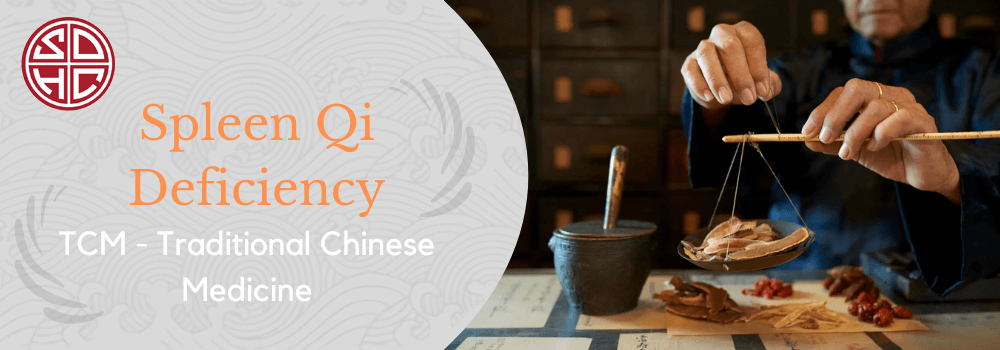
Spleen Qi Deficiency TCM - Traditional Chinese Medicine
Traditional Chinese Medicine (TCM) is an ancient system of medicine that has been used for over 2,500 years in China. It is based on the concept of Qi (pronounced "chee"), which is considered to be the vital energy or life force that flows through the body. According to TCM, illness and disease are caused by an imbalance or blockage of Qi. Therefore, TCM practitioners aim to restore balance and harmony to the body by unblocking and regulating the flow of Qi.
One of the key principles of TCM is that it looks at the whole person, rather than just treating specific symptoms. This holistic approach takes into account not just the physical symptoms, but also the emotional, mental and spiritual aspects of an individual. This is why TCM practitioners may ask about a person's diet, lifestyle, and emotional state as part of their diagnosis.
TCM practitioners use a variety of modalities to restore balance and harmony to the body, including acupuncture, herbal medicine, dietary therapy, and physical therapy. In the example given, TCM practitioners aim to nourish and strengthen the spleen, which is an organ that is considered to be responsible for the digestion and absorption of food, as well as the production of blood. A healthy spleen is considered essential for overall wellness and the prevention of disease.
TCM is a complex and holistic system of medicine that has been used for centuries, and is still widely used today, both in China and around the world. It is an alternative to conventional Western medicine and can be used alone or in conjunction with other forms of treatment. For example, TCM practitioners aim to nourish and strengthen the spleen to restore balance and promote overall wellness.
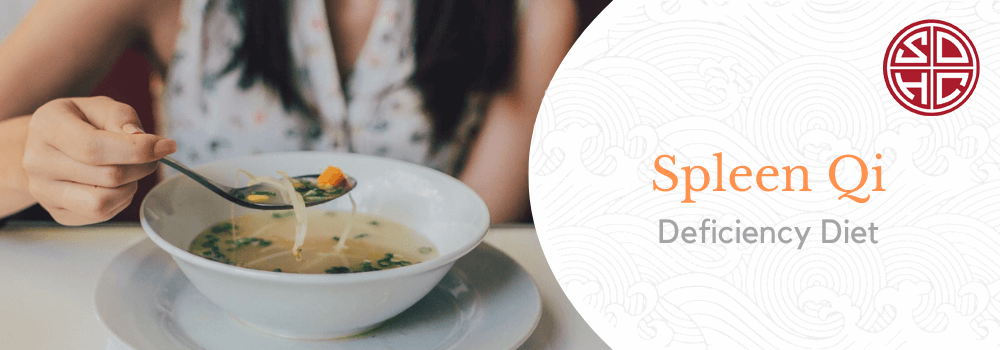
Spleen Qi Deficiency Diet
According to Traditional Chinese Medicine (TCM), spleen qi deficiency can be addressed through diet and lifestyle changes. To nourish the spleen, it is important to avoid raw, cold, dairy, gluten, sugar and greasy foods. Instead, one should opt for warm and nourishing meals like soups, stews, and stir-fries with warming vegetables and spices. Additionally, it is important to avoid iced and cold drinks, and opt for room temperature or warm beverages, such as ginger tea or hot water.
To further support the spleen, it is also recommended to avoid foods that may cause increased dampness, such as dairy, gluten, sugar, and greasy foods. These foods can lead to symptoms like soreness and pain in joints, turbid urine, and stools containing mucus. To promote spleen health, it is best to consume cooked and warming or neutral foods. Examples of warming foods include cooked vegetables like squash and yams, fruits like apricot and cherry, and nuts like coconut and chestnuts.
Spleen Qi Deficiency Tongue
In Traditional Chinese Medicine (TCM), the tongue is considered to be a "map" of the body and can provide insight into the health of the internal organs. The color, shape, and coating of the tongue can all provide information about the state of the body's Qi (vital energy) and blood. A pale tongue with a thin white coating is often considered a sign of spleen qi deficiency. This can indicate a lack of nourishment, poor digestion, and a weakened immune system.
The spleen is considered to be the "earth" element in TCM and is responsible for the transformation and transportation of nutrients, as well as the production of blood. When the spleen is not functioning properly, it can lead to a variety of symptoms such as fatigue, poor appetite, loose stools, and a tendency to be easily frightened. A pale tongue with a thin white coating can be a sign that the spleen is not properly transforming and transporting nutrients, leading to a deficiency of Qi and blood.
It's worth noting that the tongue should be observed in the context of other symptoms and physical examinations. Tongue diagnosis is just one aspect of TCM diagnosis, and a practitioner will also take into account the patient's pulse, overall appearance, and symptoms before making a diagnosis.
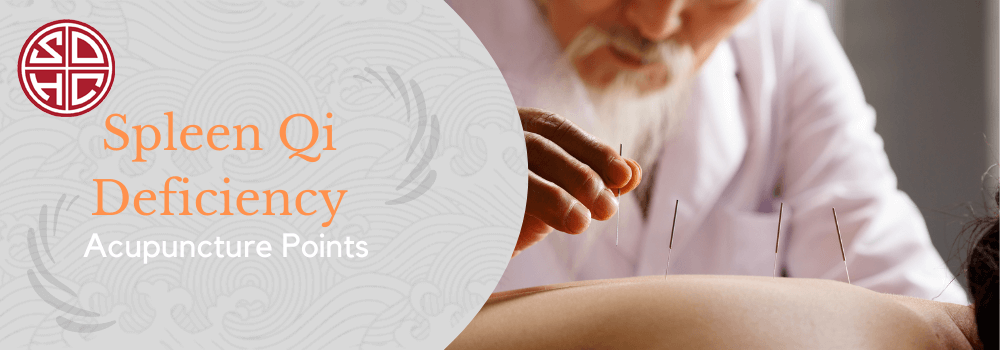
Spleen Qi Deficiency Acupuncture Points
Acupuncture is a popular and effective treatment for spleen qi deficiency in Traditional Chinese Medicine (TCM). Acupuncture is based on the principle of restoring balance and harmony to the body by stimulating specific points on the body called acupoints. By stimulating these acupoints, practitioners aim to restore the flow of energy (qi) throughout the body, and in the case of spleen qi deficiency, to strengthen and tonify the spleen.
Some of the most commonly used acupuncture points for treating spleen qi deficiency include:
Spleen 6 (SP6): Located on the inner ankle, this point is known as the "three yin intersection" and is considered to be one of the most important points for tonifying the spleen and nourishing the blood.
Spleen 9 (SP9): Located on the inner thigh, this point is used to tonify the spleen and nourish the blood, as well as to treat digestive problems such as diarrhea and abdominal distention.
Spleen 10 (SP10): Located on the side of the ribcage, this point is used to tonify the spleen, nourish the blood, and regulate the digestion.
Stomach 36 (ST36): Located on the lower leg, this point is known as the "leg three miles" and is considered to be one of the most important points for strengthening the body and promoting overall health.
Ren 12 (CV12): Located on the midline of the abdomen, this point is known as the "sea of Qi" and is used to regulate digestion and strengthen the spleen.
It's important to note that acupuncture treatment is tailored to the individual patient and a practitioner will select points based on the patient's unique symptoms and overall health condition.
It's also worth noting that acupuncture is a holistic method of healing, and practitioners may use other modalities like herbal medicine, dietary recommendations and lifestyle changes to help the body achieve balance.
How to Heal Spleen Qi Deficiency
Healing Spleen Qi Deficiency typically involves a combination of different treatment methods to address the underlying causes and alleviate symptoms. One of the most important aspects of treatment is making dietary and lifestyle changes. This can include eating a diet that is easy to digest, avoiding foods that are cold, raw or greasy, and eating more warming and nourishing foods such as soups, stews, and cooked vegetables.
Acupuncture is another effective treatment option for Spleen Qi Deficiency. Acupuncture can help to improve digestion, increase the circulation of Qi and blood, and strengthen the Spleen. Herbal medicine can also be used in conjunction with acupuncture to support the Spleen and improve digestion.
In addition to these physical treatments, it is also important to practice stress-relieving activities such as exercise, yoga, and meditation. These activities can help to reduce stress and anxiety, which can aggravate Spleen Qi Deficiency. Exercise can also improve circulation, which can help to nourish the Spleen and improve digestion. Yoga and meditation can help to reduce stress and anxiety, and also improve overall well-being.
Furthermore, it's important to consult with a licensed practitioner of Traditional Chinese Medicine (TCM) or other alternative therapies to get the proper diagnosis and personalized recommendations.
It's worth noting that healing Spleen Qi Deficiency requires patience and commitment, as it often takes time to address the underlying causes and to see improvements. However, with the right approach, it is possible to improve symptoms and overall well-being.
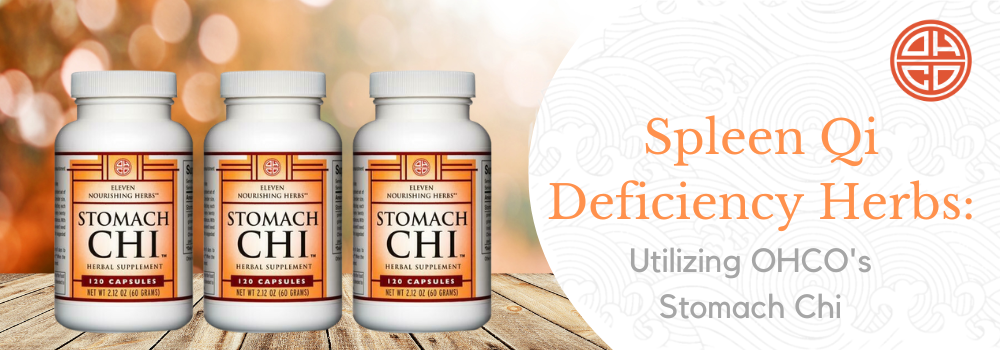
Spleen Qi Deficiency Herbs: Utilizing OHCO's Stomach Chi
Herbs can also be used to help nourish and strengthen the spleen. Snap Dynasty's Stomach Chi supplement is specially formulated with a blend of herbs that have been traditionally used in Traditional Chinese Medicine (TCM) to tonify the spleen and stomach, promote healthy digestion, and nourish the qi.
These herbs include Pinellia (root), Poria (fruiting body), Oriental ginseng (root), Atractylodes (root), Ginger (root), Magnolia (bark), Saussurea (root), Chinese cardamom (seed), Tangerine (aged peel), Perilla (leaf), and Licorice (root).
-Pinellia, for example, is known for its ability to reduce phlegm and promote digestion
-Poria is known for its ability to strengthen the spleen and promote urination
-Oriental ginseng helps to tonify the Qi
-Atractylodes strengthens the Spleen and Stomach
-Ginger is known for its warming properties
-Magnolia is known to help with digestion and reducing phlegm
-Saussurea is known for its ability to strengthen the Qi and promote circulation
-Chinese cardamom is known to help with digestion and warming the middle jiao
-Tangerine (aged peel) is known to help with digestion and reducing phlegm
-Perilla leaf is known to help with reducing phlegm and promoting digestion
-Licorice is known for its ability to nourish the Qi and harmonize the middle jiao
OHCO Oriental Herb Company is a reputable and respected company that specializes in creating natural and effective herbal supplements to improve overall health and well-being. They are committed to providing high-quality and safe products that are backed by research and Traditional Chinese Medicine principles.
Their products are designed to address a wide range of health concerns, including Spleen Qi Deficiency. By using OHCO's products, you can trust that you are taking a step towards improving your health and increasing your energy levels and vitality. Their website, www.ohco.com, is a great resource to learn more about their products, and how they can help to improve your overall health and well-being.
It's important to note that while Stomach Chi can be helpful for those with spleen qi deficiency, it's always best to consult with a licensed practitioner of TCM before starting any new supplement regimen. They can help you determine the best course of treatment for your specific condition and ensure that the supplement you choose will not interfere with any other medications or treatments you may be receiving.
In conclusion, spleen qi deficiency is a common condition that can manifest as a variety of symptoms. By understanding the causes and symptoms of this condition, as well as the various treatment options available, individuals can take steps to nourish and strengthen their spleen and promote overall wellness.






Leave a comment
This site is protected by reCAPTCHA and the Google Privacy Policy and Terms of Service apply.